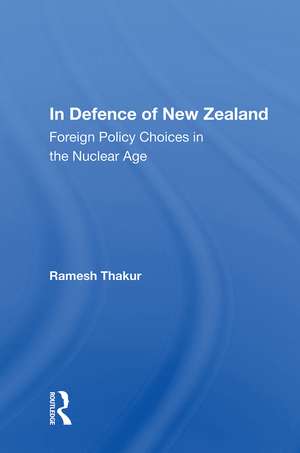In Defence of New Zealand: Foreign Policy Choices in the Nuclear Age
Autor Ramesh Thakuren Limba Engleză Hardback – 23 mai 2019
| Toate formatele și edițiile | Preț | Express |
|---|---|---|
| Paperback (1) | 385.74 lei 6-8 săpt. | |
| Taylor & Francis – 23 noi 2020 | 385.74 lei 6-8 săpt. | |
| Hardback (1) | 765.01 lei 6-8 săpt. | |
| Taylor & Francis – 23 mai 2019 | 765.01 lei 6-8 săpt. |
Preț: 765.01 lei
Preț vechi: 1027.88 lei
-26% Nou
Puncte Express: 1148
Preț estimativ în valută:
146.40€ • 151.92$ • 122.37£
146.40€ • 151.92$ • 122.37£
Carte tipărită la comandă
Livrare economică 18 martie-01 aprilie
Preluare comenzi: 021 569.72.76
Specificații
ISBN-13: 9780367006488
ISBN-10: 0367006480
Pagini: 264
Dimensiuni: 152 x 229 mm
Greutate: 0.5 kg
Ediția:1
Editura: Taylor & Francis
Colecția Routledge
Locul publicării:Oxford, United Kingdom
ISBN-10: 0367006480
Pagini: 264
Dimensiuni: 152 x 229 mm
Greutate: 0.5 kg
Ediția:1
Editura: Taylor & Francis
Colecția Routledge
Locul publicării:Oxford, United Kingdom
Cuprins
Westview Special Studies -- Foreword -- Introduction -- The Nuclear Debate -- The ANZUS Alliance -- The ANZUS Debate -- Nonalignment -- Neutrality -- Nuclear Free Pacific -- Port Access and Alliance Management -- Conclusion -- Appendixes
Descriere
Nuclear-free zones, neutrality, and nonalignment are catchwords that recently have earned unprecedented international publicity for New Zealand's foreign policy. That country's defence policy has also been subjected to its most searching scrutiny since World War II. In this book, Dr. Ramesh Thakur addresses in depth the issues underlying worldwide interest in the area and places his study of New Zealand policy in the global nuclear context. The ANZUS alliance and the 1951 treaty that created it are attended by a range of collaborative activities in defence, intelligence, naval exercises, and C3I facilities. Dr. Thakur weighs the values and opportunity costs of ANZUS for New Zealand's pursuing a nonaligned or neutral policy and analyses the 1985 establishment of a nuclear-free zone for the South Pacific in light of similar precedents elsewhere. Dr. Thakur concludes that rather than indicating a radically new course, a thorough review of New Zealand's defence and foreign policies may well provide renewed justification for existing alliance structures.
